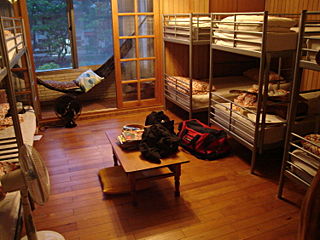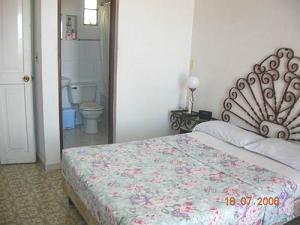| Part of a series on |
| Homestays |
|---|
| Hospitality exchange services |
| Hospitality for work |
| Hospitality for money |
| Home exchange and others |
Homestay (also home stay and home-stay) is a form of hospitality and lodging whereby visitors share a residence with a local of the area (host) to which they are traveling. The length of stay can vary from one night to over a year and can be provided for free (gift economy), in exchange for monetary compensation, in exchange for a stay at the guest's property either simultaneously or at another time (home exchange), or in exchange for housekeeping or work on the host's property (barter economy). Homestays are examples of collaborative consumption and the sharing economy. [1] Homestays are used by travelers; students who study abroad or participate in student exchange programs; and au pairs, who provide child care assistance and light household duties. They can be arranged via certain social networking services, online marketplaces, or academic institutions. [2] Social networking services where hosts offer homestays for free are called hospitality exchange services.
Homestays offer several advantages, such as exposure to everyday life in another location, the opportunity to experience local culture and traditions, opportunities for cultural diplomacy, friendship, intercultural competence, and foreign language practice, local advice, and a lower carbon footprint compared to other types of lodging; however, they may have rules and restrictions, such as curfews, facility usage, and work requirements, and may not have the same level of comfort, amenities, and privacy as other types of lodging. [3] [4] [5] [6] [7] [8] [9] [10]

A hotel is an establishment that provides paid lodging on a short-term basis. Facilities provided inside a hotel room may range from a modest-quality mattress in a small room to large suites with bigger, higher-quality beds, a dresser, a refrigerator, and other kitchen facilities, upholstered chairs, a flat-screen television, and en-suite bathrooms. Small, lower-priced hotels may offer only the most basic guest services and facilities. Larger, higher-priced hotels may provide additional guest facilities such as a swimming pool, a business center with computers, printers, and other office equipment, childcare, conference and event facilities, tennis or basketball courts, gymnasium, restaurants, day spa, and social function services. Hotel rooms are usually numbered to allow guests to identify their room. Some boutique, high-end hotels have custom decorated rooms. Some hotels offer meals as part of a room and board arrangement. In Japan, capsule hotels provide a tiny room suitable only for sleeping and shared bathroom facilities.

The Pasporta Servo is a hospitality exchange service available both online and in print that lists people in Esperanto culture who are willing to offer free homestays to speakers of Esperanto. It is maintained by the World Esperanto Youth Organization (TEJO). The platform is a gift economy; hosts are not allowed to charge for lodging. Guests using the service are encouraged to speak only Esperanto with their hosts.
Hospitality Club (HC) was a hospitality exchange service accessible via a website.

Lodging refers to the use of a short-term dwelling, usually by renting the living space or sometimes through some other arrangement. People who travel and stay away from home for more than a day need lodging for sleep, rest, food, safety, shelter from cold temperatures or rain, storage of luggage and access to common household functions. Lodging is a form of the sharing economy.

A hostel is a form of low-cost, short-term shared sociable lodging where guests can rent a bed, usually a bunk bed in a dormitory sleeping 4–20 people, with shared use of a lounge and usually a kitchen. Rooms can be mixed or single-sex and have private or shared bathrooms. Private rooms may also be available. Hostels are popular forms of lodging for backpackers, however very few impose age limits, so hostels are an option for travellers of all ages and styles. The benefits of hostels include lower costs and opportunities to meet people from different places, find travel partners, and share travel experiences. Some hostels, such as in India or Hostelling International, cater to a niche market of travelers. Different hostels can be known for offering different experiences. For example, one hostel might feature in-house social gatherings such as movie nights or communal dinners, another might feature local tours, one might be known for its parties, and another might have a quieter place to relax in serenity, or be located on the beach. Newer hostels focus on a more trendy design, some of which are on par with boutique hotels. Some may cater to older digital nomads, global nomads, and perpetual travelers who prefer slightly more upmarket private rooms or a quieter atmosphere. Hostels may also differentiate themselves by being environmentally friendly ecohostels. In countries where wages are lower, the cost of staying at a hostel may be similar to staying in a budget hotel.

A student exchange program is a program in which students from a secondary school or higher education study abroad at one of their institution's partner institutions. A student exchange program may involve international travel, but does not necessarily require the student to study outside their home country.
Home exchange, also known as house swapping, is a form of lodging in which two parties agree to offer each other homestays for a set period of time. Since no monetary exchange takes place, it is a form of barter, collaborative consumption, and sharing. Home exchange can cover any type of residence including apartments, houses, holiday cottages, boats, or recreational vehicles. It can include an exchange of the entire home or just a room. The length of the swap can vary from a weekend to over a year. The swap can be simultaneous or non simultaneous. Home exchanges are usually arranged via specific types of social networking services, most of which charge a fee.

A vacation rental is the renting out of a furnished apartment, house, or professionally managed resort-condominium complex on a temporary basis to tourists as an alternative to a hotel. The term vacation rental is mainly used in the US. Other terms used are self-catering rental, holiday home, holiday let, cottage holiday and gite.
CouchSurfing is a hospitality exchange service by which users can request free short-term homestays or interact with other people who are interested in travel. It is accessible via a website and mobile app. It uses a subscription business model, and while hosts are not allowed to charge for lodging, members in some countries must pay a fee to access the platform.

Casa particular is a phrase meaning private accommodation or private homestays in Cuba, very similar to a bed and breakfast, although it can also take the form of a vacation rental. When the meaning is clear, the term is often shortened to simply casa. Today, many casas particulares are rented through online agencies, some specifically Cuban, and others that work worldwide.
A travel website is a website that provides travel reviews, trip fares, or a combination of both. Over 1.5 billion people book travel per year, 70% of which is done online.

Hospitality exchange services are social networking services used for accommodation of travellers, where hosts do not receive payments. The relationships on hospitality exchange services are shaped by altruism and are related to the cyber-utopianism on the Web in its beginnings and to utopia in general.
Asian Pacific Children's Convention in Fukuoka, Japan, is a non-profit making organization which promotes peace and co-existence throughout the world under the theme "We are the BRIDGE: We connect dreams around the world".

Airbnb, Inc. is an American company operating an online marketplace for short- and long-term homestays and experiences. The company acts as a broker and charges a commission from each booking. The company was founded in 2008 by Brian Chesky, Nathan Blecharczyk, and Joe Gebbia. Airbnb is a shortened version of its original name, AirBedandBreakfast.com. Airbnb is the most well-known company for short-term housing rentals.

Brian Joseph Chesky is an American businessman and industrial designer and the co-founder and CEO of Airbnb. As of January 2024, Chesky is the 232nd richest person in the world according to Forbes, with a net worth of $9.4 billion, mostly due to his ownership of 76 million shares of Airbnb.

Workaway is a platform that allows members to arrange homestays and cultural exchange. Volunteers or "Workawayers", are expected to contribute a pre-agreed amount of time per day in exchange for lodging and food, which is provided by their host.

misterb&b is a travel and social networking website that provides a searchable database of LGBTQ-friendly rentable lodging, including rooms, apartments, hotels, and homestays, primarily catering to gay men. It is accessible via a website and a mobile app.
ThirdHome is a global home exchange service, specializing in luxury properties, founded by Wade Shealy in 2010. With its headquarters in Brentwood, Tennessee, United States, the company operates internationally, positioning itself uniquely to cater exclusively to owners of second homes.
Sonder Holdings Inc. manages short-term rentals, such as apartment hotels, in North America, Europe, and Dubai. It was founded in Montreal, Canada in 2014 and since 2016 has been based in San Francisco, California.
Warm Showers (WS) is a non-profit hospitality exchange service for people engaging in bicycle touring. The platform is a gift economy — hosts are not supposed to charge for lodging and are not bound. The legal form is a Colorado 501(c)(3) nonprofit organization headquartered in Boulder, Colorado, US.